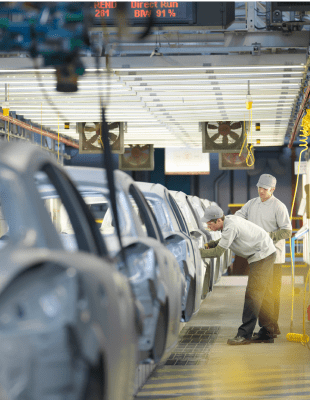As the outlook for the global economy remains uncertain, industrial manufacturing in the UK is facing the daunting challenge of rising costs. The combination of sharply increasing wages and labour shortages, an ageing industrial asset base, and more stringent environmental regulations, has led to a precarious situation for the sector.
There are several reasons for this development, of which inflation features most prominently in the national discourse and its impact was highlighted in our recent International Construction Costs 2023 report. While the Consumer Price Index (CPI) showed price increases of over 10% year-over-year for the beginning of 2023 and is only slowly moving down, some categories have been outliers. Amongst those, on an annual basis electricity prices are up 6.7% in August 2023, while steel prices are slowly retracting from last year’s highs that were up to 200% higher than levels in 2020.
Challenges in Industrial manufacturing
These challenges, combined with persistent supply chain disruptions, are putting immense pressure on manufacturers. The UK's GDP forecast indicates a modest growth of around 0.3% in 2023, while the yearly change in the manufacturing sector's output has only recently turned positive again. Despite these headwinds, we’ve been successful in helping our clients adapt and together explore innovative strategies to stay competitive and manage costs effectively.
Effective cost management strategies
Revitalising ageing assets: The first step towards securing a sustainable manufacturing landscape involves addressing the ageing asset base. Manufacturers must adopt a capex and opex strategy that encompasses the entire lifecycle (building and machinery), incorporating a long-term assessment of costs, savings and prospective benefits. It is paramount to evaluate the trade-offs between maintenance and new capital expenditures, as rejuvenating existing assets might be the desired strategy to keep costs under control. It is also crucial that capex and opex do not operate in silos but communicate with each other to optimise the asset.
Maximising materials efficiency: Ensuring efficient and effective utilisation of materials is essential. Minimising waste through efficient usage and recycling, coupled with employing high-quality, durable materials can significantly reduce production costs while maintaining high manufacturing standards.. Proper storage practices also contribute to prolonging material lifespan, further reducing waste.
Optimising processes: Streamlining processes and communication across departments can enhance overall efficiency and help employees optimise their time at work. Careful testing and implementation of process improvements are crucial to maintaining smooth operations and achieving optimal performance.
Leveraging automation to reduce labour costs: The scarcity of skilled labour presents a prevailing challenge. Automation serves as a viable remedy, not only diminishing manual labour expenses but also bolstering overall efficiency and precision. While initial automation investments may be substantial, the long-term benefits, encompassing error reduction, amplified productivity, and adaptability to shifting production demands, far outweigh the costs. Considering the UK’s comparatively low productivity, this form of capital deepening can be especially fruitful to help reduce costs in manufacturing processes.
Sustaining competitiveness by innovating for the future
Embracing ESG and decarbonisation: Forward-thinking manufacturers are capitalising on Environmental, Social, and Governance (ESG) initiatives and decarbonisation strategies. By investing in green technologies and energy efficiency, manufacturers can counteract prohibitive energy costs while positioning themselves as ecologically responsible contenders on the global stage. In International Construction Costs 2023 we advise that although investing in ESG initiatives will incur short-term costs, if asset owners invest now they will actually create cost savings in the long-term. At Arcadis, we recently worked with a global automotive manufacturer to conduct a whole life carbon assessment on their UK manufacturing site to identify steps to reduce emissions and determine the overall cost of achieving their net zero goals.
Championing innovation and digital transformation: Innovation remains a critical component of manufacturers' success. Incorporating emerging technologies like augmented reality, digital twins and predictive data analytics can streamline production, reduce waste and uncover new growth avenues. Staying attuned to customer expectations and market trends ensures sustained competitiveness. Arcadis has vast experience implementing innovative digital solutions on our industrial manufacturing client’s projects. We recently utilised our digital project management solution, DataFrame, to facilitate seamless project delivery for a major consumer goods manufacturer. This enabled various stakeholders to collaborate effectively on an accessible digital platform and provided the client with real live project data reporting on the cost, design and programme status.
Empowering workforce through upskilling: The shortage of skilled labour is a persistent phenomenon across many sectors. Manufacturers are investing in upskilling and retraining programmes for existing staff to meet the demands of technological advancements. By aligning workforce capabilities with evolving industry needs, manufacturers can bridge skill gaps and optimise workforce efficiency.
Charting the path forward
As the UK's industrial manufacturing sector contends with soaring costs, labour constraints, and supply chain disruptions, a proactive and strategic approach is pivotal to navigating these challenges. By embracing automation, optimising processes, and prioritising materials efficiency, manufacturers can mitigate operational expenses without compromising product quality. Moreover, the integration of ESG initiatives, investments in innovation, and the elevation of workforce skills position manufacturers as leaders within a dynamic and evolving industry. As the sector charts its course through these turbulent times, adaptation, innovation, and strategic thinking will be the cornerstones of success.



